Ichtyofauna
Hydroelectric undertaking deployment requires water impoundment and pond formation. As a consequence, part of river bed natural course is changed, also implying in water flow dynamic changes (lotic to lentic environment). Such changes can impact aquatic community, modifying its composition and benefiting some species and not others.
What is more, along such undertaking operation, some specific situations can jeopardize fish fauna, causing, for instance, that they get stuck in specific locations, due to water level oscillations in the reservoir or machine confinement during power station maintenance procedures.
To minimize possible impacts that such environment changes can have over ichtyofauna, Copel develops several programs that involve fish rescue during dam construction stage, and during hydroelectric operation, ichtyofauna regular monitoring in its reservoirs and actions aimed at fish survey, reproduction and release.
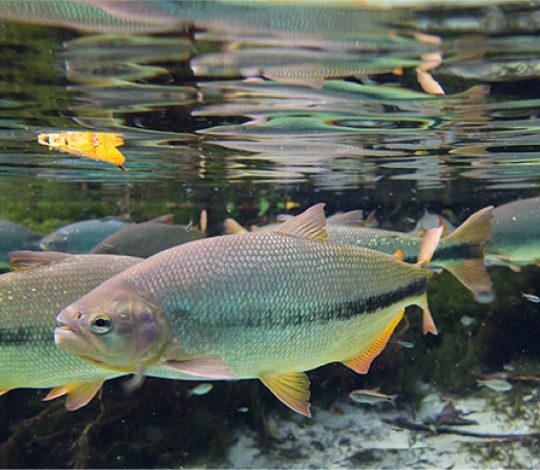
Ichtyofauna Rescue and Monitoring
Committed to the conservation of biodiversity, Copel carries out several activities aimed at monitoring and rescuing fish, aiming to avoid, minimize and compensate for the impact on the ichthyofauna (fish fauna) existing in the reservoirs and rivers under its responsibility.
The first monitoring actions were started in 1993 and, since then, the Company’s activities have allowed the survey of different species and it has consolidated itself as an important tool in mapping the richness of ichthyofauna species in the monitored areas, including the identification of threatened species. of extinction.

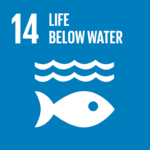

Copel’s ichthyofauna monitoring activities identified some threatened species that occur in the areas of influence of the Company’s projects. In all, adding the threatened species recorded in all the projects monitored, 12 species were recorded in the category Endangered (EN), five of them for UHE Colíder and seven for the plants in Paraná (Table).
Considering all threat categories, in the watersheds of the State of Paraná, 107 species are catalogued in the Red List of Threatened Fauna of the Ministry of Environment (MMA, 2018), with 8 species in the Endangered (EN) category and 99 in the Least Concern (LC) category. Nine of them are on the Red List of Threatened Species (IUCN, 2021), with eight in the LC category and one in the EN category.
The monitoring of ichthyofauna during the operation of hydroelectric plants, and a thermal power plant, has recorded the presence of endangered species over the past 19 years.
The infographic shows the number of individuals of species in some degree of threat recorded in the reservoirs monitored in the state of Paraná, from 2002 to 2021.
List of endangered species by watershed where Copel operates and by monitored enterprise.
NC – not listed; EN – endangered; VU – vulnerable; LC – least concern;
* – exotic species to the watershed.
Empreendimentos | Espécies | Categoria de ameaça | |||
Lista Vermelha MMA – 2018 | IUCN – 2020 | CITES – 2020 | |||
Atlântico Sul | UHE GNA | Brycon orbignyanus* | EN | NC | NC |
Iguaçu | UHE CIM | Steindachneridion melanodermatum | EN | NC | NC |
UHE DRJ | Steindachneridion melanodermatum | EN | NC | NC | |
Astyanax jordanensys | EN | NC | NC | ||
Cnesterodon ormogmatus | EN | NC | NC | ||
Jenysia diphyes | EN | NC | NC | ||
UHE GBM | Astyanax gymnogenys | EN | NC | NC | |
UHE GJR | Astyanax gymnogenys | EN | NC | NC | |
Steindachneridion melanodermatum | EN | NC | NC | ||
UHE GNB | Astyanax gymnogenys | EN | NC | NC | |
Steindachneridion melanodermatum | EN | NC | NC | ||
Brycon orbignyanus* | EN | NC | NC | ||
Tibagi | UHE APC | Brycon orbignyanus | EN | NC | NC |
UTE FRA | Brycon nattereri | VU | NC | NC | |
Teles pires | UHE CLR | Brachyplatystoma filamentosum | LC | NC | NC |
Teleocichla prionogenys | VU | NC | NC | ||
Harttia dissidens | VU | NC | NC | ||
Rhinopetitia potamorhachia | EN | NC | NC | ||
Hoplias aimara | LC | NC | NC | ||
The identification of endangered species is an important tool for biodiversity conservation and allows efforts to be directed towards more specific and targeted actions, such as those carried out at the Experimental Station for Ichthyological Studies at Copel GeT, through reproduction and repopulation actions.
Fish species survey in the reservoirs where Copel works is performed by means of Ichtyofauna Monitoring Program. The monitoring actions are performed in 18 reservoirs, currently widespread in four river basins in Paraná State and one in Mato Grosso State.


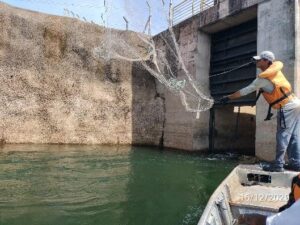

Copel GeT teams perform fish rescue during power station deployment, operation and maintenance. Some power station activities can cause fish trapping in inappropriate locations, putting them in hazard situation.
In order to prevent impacts to fish communities, EEEI technicians and biologists follow such maintenance activities, rescuing the fish that, occasionally, get trapped, and releasing them in a safe area, within their environment limits.
Each rescue event is a risky activity, involving technicians and specialized equipment. Copel’s good ichthyofauna rescue practices are reflected in the excellent success rate of the actions: on average, more than 98% of fish are rescued alive and returned to nature.

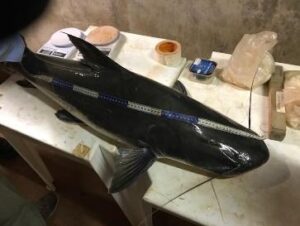
Species wealth refers to the number of species that occur within a specific geographic space. In case of Copel, these
are the species that occur within its undertaking influence area under its concession, specifically in hydroelectric
power stations and in one thermal power station.
Nowadays, 235 species are registered within the river basin Company operation areas in Paraná State and 302 species in
Colíder Hydroelectric Power Plant influence area in Mato Grosso State.
Fish species wealth by river basin, where Copel works, and by monitored undertaking. between 2002 and 2020.
| Bacias Hidrográficas | Período de monitoramento | Empreendimentos | Nº de espécies |
| South Atlantic | 2002 – 2020 | CHE Small Hydro Power Plant | 53 |
GNA Small Hydro Power Plant | 46 | ||
GPS Hydroelectric Power Plant | 64 | ||
| Iguaçu | 2002 – 2020 | CAV/CAS Small Hydro Power Plant | 37 |
CIM Small Hydro Power Plant | 49 | ||
DRJ Small Hydro Power Plant | 44 | ||
GBM Hydroelectric Power Station | 74 | ||
GJR Hydroelectric Power Station | 83 | ||
GNB Hydroelectric Power Plant | 105 | ||
SVU Small Hydro Power Plant | 33 | ||
| Tibagi | 2002 – 2020 | APC Small Hydro Power Plant | 52 |
GJC Hydroelectric Power Station | 83 | ||
PGI Small Hydro Power Plant | 40 | ||
SJR Small Hydro Power Plant | 60 | ||
FRA Hydroelectric Power Station | 76 | ||
| B. Piquiri | 2002 – 2020 | MEL Small Hydro Power Plant | 55 |
| Teles pires | 2011 – 2020 | CLR Hydroelectric Power Station | 302 |
Some species instances registered in the monitoring are provided below.
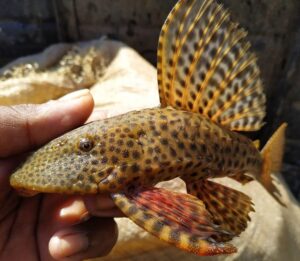
Hypostomus
sp. (Iguaçu Basin).
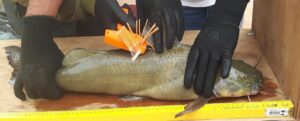
zungaro (Teles pires Basin).
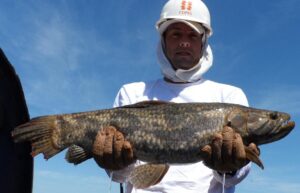
Hoplias aimara (Teles Pires Basin).
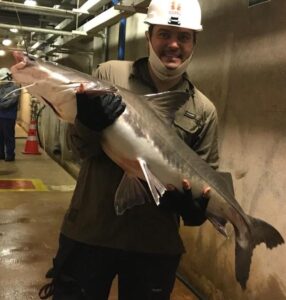
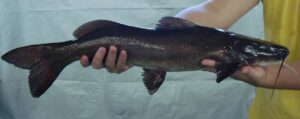
Fish Reproduction and Repopulation
Foreseen as environment offset actions in benefit of the biodiversity, fish reproduction and repopulation activities started within the environment licensing scope of Governador Ney Aminthas de Barros Braga Hydroelectric Power Station, known at the time as Segredo Power Station.
Repopulation actions developed by Copel have environment mitigation and offset feature, as the fish raised in Fish Study Experimental Station (EEEI) do not have commercial interest, the aim is native species conservation.




